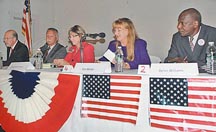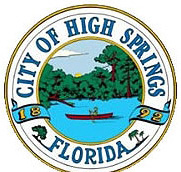 L-R: Bob Barnas, William Coughlin, Linda Clark Gestrin, Sue Weller, and Byran Williams faced off at a candidates’ forum Tuesday night, vying for votes in the city commission election to be held Nov. 2.
L-R: Bob Barnas, William Coughlin, Linda Clark Gestrin, Sue Weller, and Byran Williams faced off at a candidates’ forum Tuesday night, vying for votes in the city commission election to be held Nov. 2.
Money, alcohol, the future and city morale were some of the topics of discussion at Tuesday night’s candidates’ forum.
The High Springs New Century Women’s Club hosted the hour-long event to provide an opportunity for city commission candidates to answer questions from the community.
The candidates sat side by side as they passed a microphone back and forth, each giving his or her answer, or rebuttal, to the five questions picked out of a hat.
Linda Clark Gestrin, Byran Williams, Bob Barnas, Sue Weller and current High Springs Mayor Bill Coughlin are vying for two commission seats up for grabs in November.
John Hill, who was appointed to replace Diane Shupe after she resigned, holds one of the open seats, and Coughlin occupies the other. Hill is not running.
Each candidate offered an opening statement sharing their background with the audience of about 40 and explained why they deserve a vote.
Meet the candidates
Clark-Gestrin said she was excited to be there, and she wants to “help restore respect and common sense to City Hall.”
Williams proclaimed his pride and allegiance to Santa Fe High School as a 1976 graduate. He made it clear that he loves High Springs, and he is about unity in the community, not division.
He told the audience, “We all belong to High Springs.”
Acknowledging his competition, Barnas said every candidate wants the best for the city, they just differ on how to improve it.
But, he said, “It’s time for change.”
He also reminded the audience that he has been a licensed realtor since 2005, and by law he must always “account for all funds,” stressing that is exactly what he’ll do as a commissioner.
Weller pointed out her 24 years of experience working for the City of Miami, for 12 of which she was director of labor relations. She said one of her major concerns now in High Springs is that the current commission has ignored recommendations from economic task forces.
Coughlin, who is nearing the end of his second, though not consecutive, term on the commission, talked about his experience serving in the United States Navy for six years and his experience serving the community of High Springs.
He said he wants “to keep the nice town we’re used to, but we have to be able to pay our bills.”
The issues at hand
The first question stated there appears to be dissatisfaction with city government, and low morale at City Hall; what would each candidate do to restore trust and confidence and raise morale?
The first four to speak echoed each other, agreeing on the need for open communication, government transparency and accessibility.
The current mayor not only disagreed with these answers, but he challenged the premise of the question itself, saying there isn’t dissatisfaction with the current commission. He said that before he was elected three years ago, businesses downtown couldn’t have lit “open” signs, and the city budget was headed for a train wreck.
As for low morale at City Hall, he said he knows of plenty of employees who are “happy as clams.”
The second question addressed the recent debate over how to prioritize public safety in the city budget.
“I think public safety is paramount,” said Weller.
Williams and Clark Gestrin both shared similar philosophies, saying that it is and must always be No. 1. Citizens want to be safe in their community, said Williams.
Clark Gestrin added that to support this priority and the current level of service, the city has to expand its tax base.
Coughlin was critical of High Springs for having a police department, fire department and dispatch center as compared to other towns its size of fewer than 5,000 residents, most of which, he said, do not operate their own departments.
Barnas said the majority of residents want to keep the level of services they have, and he supports that, but overtime scheduling needs to be modified, and he wants to avoid raising taxes or fees.
Perhaps one of the most anticipated subjects, question No. 3 asked candidates whether they agree with the recent action to terminate City Manager Jim Drumm, and how they view the role of city manager.
While Barnas and Williams both suggested they did not necessarily disagree that Drumm should leave, they didn’t like the way it was done. Questions were raised why the commission wouldn’t wait until January, when Drumm’s contract could be non-renewed, and the city wouldn’t have to pay him severance.
Coughlin refrained from commenting on the basis that he represents the commission and the city, which is in the midst of negotiations with Drumm, and Clark Gestrin said she didn’t have all pertinent information to pass judgment.
Only Weller disagreed with Drumm’s dismissal, saying he’s done a good job in his role as city manager, and the commission shouldn’t be trying to micromanage.
The next question touched on another timely hot-button issue: alcohol.
The candidates were asked that if it meant more restaurants would set up shop in High Springs, would they amend the rule that alcohol cannot be sold (for immediate consumption) within 500 ft. of a church. Currently, retail stores like gas stations and convenience stores can sell packaged alcohol, such as six-packs of beer and bottles of wine, within 500 ft. of a church, but restaurants cannot serve alcohol if they are within such distance.
Weller was the only candidate to say she would consider amending the law to less than 500 ft.
The last question prompted the five opponents to describe what they see as High Springs’ most outstanding feature, and how they see the city economy developing in the future.
The consensus was that the city’s most prized features are the people who live there, the rivers and springs running through it and the historic district.
Barnas seemed to lead the charge for promoting the area’s natural attractions, and taking advantage of all the traffic passing through, whereas Coughlin stood fast that new business needs to be brought in, including some industry, because above all else, there needs to be local job opportunities.
Williams and Clark Gestrin also stressed the importance of promoting local business, and Weller echoed Barnas on the value of the springs and also the historic downtown area.
Now it’s up to the voters
After the forum concluded, Commissioner Larry Travis said he thought it went fine, but was disappointed that more residents didn’t come out to listen to what the candidates had to say.
The majority of people who did show, he said, are ones who have already made up their mind and know who they’re going to vote for.
It’s the people who didn’t come who would benefit from having more information to base their decision on, because their minds might not be made up yet, he added.
Vice Mayor Eric May thought people didn’t come because they have already decided. He also said he thinks voter turnout will be strong despite the lack of attendance at the forum.
 At a last-minute meeting Thursday afternoon, the city commission gave unanimous approval to accept a resignation agreement from its City Manager, Jim Drumm.
At a last-minute meeting Thursday afternoon, the city commission gave unanimous approval to accept a resignation agreement from its City Manager, Jim Drumm.

 Sunshine and cool temperatures set the stage for a great turnout at the Alachua Harvest Festival this past Sunday. The daylong event held in downtown Alachua featured fun-filled festivities for the whole family along with special attractions, tasty cuisine, carnival like games, a multitude of vendors, and continuous live performances. Sponsored by the Alachua Business League, SunState Federal Credit Union, Gator Dominos, Alachua Printing and the City of Alachua, admission to the 8th annual festival was free to the public. The festival is held annually in October and attracts visitors from all over the area to Main Street, Alachua.
Sunshine and cool temperatures set the stage for a great turnout at the Alachua Harvest Festival this past Sunday. The daylong event held in downtown Alachua featured fun-filled festivities for the whole family along with special attractions, tasty cuisine, carnival like games, a multitude of vendors, and continuous live performances. Sponsored by the Alachua Business League, SunState Federal Credit Union, Gator Dominos, Alachua Printing and the City of Alachua, admission to the 8th annual festival was free to the public. The festival is held annually in October and attracts visitors from all over the area to Main Street, Alachua. L-R: Bob Barnas, William Coughlin, Linda Clark Gestrin, Sue Weller, and Byran Williams faced off at a candidates’ forum Tuesday night, vying for votes in the city commission election to be held Nov. 2.
L-R: Bob Barnas, William Coughlin, Linda Clark Gestrin, Sue Weller, and Byran Williams faced off at a candidates’ forum Tuesday night, vying for votes in the city commission election to be held Nov. 2.